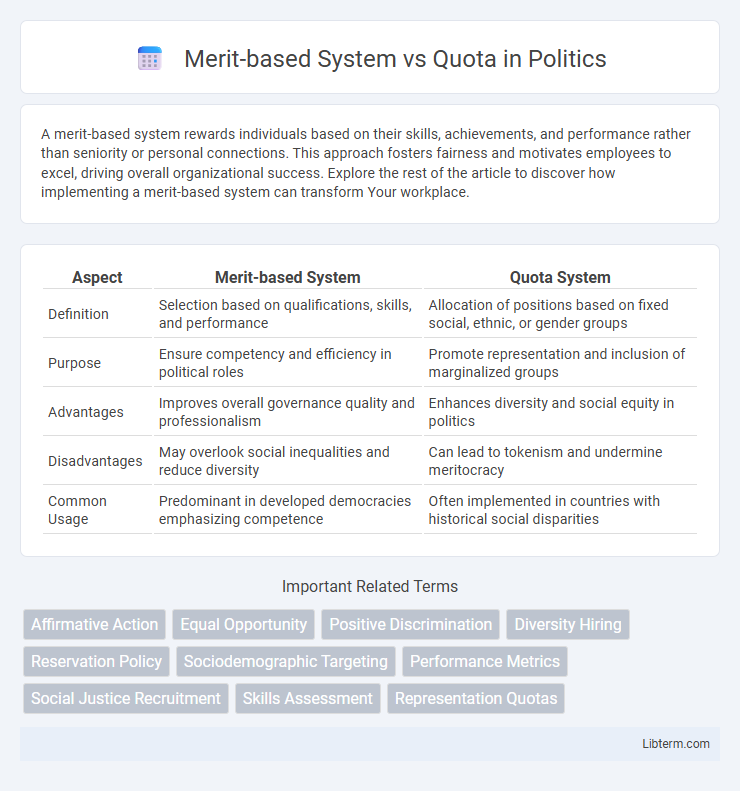A merit-based system rewards individuals based on their skills, achievements, and performance rather than seniority or personal connections. This approach fosters fairness and motivates employees to excel, driving overall organizational success. Explore the rest of the article to discover how implementing a merit-based system can transform Your workplace.
Table of Comparison
| Aspect | Merit-based System | Quota System |
|---|---|---|
| Definition | Selection based on qualifications, skills, and performance | Allocation of positions based on fixed social, ethnic, or gender groups |
| Purpose | Ensure competency and efficiency in political roles | Promote representation and inclusion of marginalized groups |
| Advantages | Improves overall governance quality and professionalism | Enhances diversity and social equity in politics |
| Disadvantages | May overlook social inequalities and reduce diversity | Can lead to tokenism and undermine meritocracy |
| Common Usage | Predominant in developed democracies emphasizing competence | Often implemented in countries with historical social disparities |
Introduction to Merit-based Systems and Quotas
Merit-based systems allocate opportunities and resources according to individual achievements, skills, and qualifications, emphasizing fairness and performance. Quota systems reserve a fixed percentage of opportunities for specific groups to promote diversity and address historical inequities. Both approaches aim to balance equity and efficiency but differ fundamentally in selection criteria and implementation.
Defining Merit: What Does It Really Mean?
Defining merit in a merit-based system centers on measurable achievements such as academic performance, skills, and competencies, ensuring candidates are evaluated on ability and potential. In contrast, quota systems prioritize equitable representation of specific groups, balancing social inclusion with qualification standards. The debate hinges on whether merit strictly reflects individual capability or should incorporate broader societal equity considerations.
Understanding Quota Systems: Purpose and Types
Quota systems allocate opportunities based on predetermined categories such as ethnicity, gender, or socioeconomic status to promote representation and address historical inequalities. Their purpose is to ensure diversity and equal access in education, employment, and political participation where merit-based selection alone may perpetuate disparities. Common types include fixed quotas, reserved seats, and percentage-based allocations, each designed to balance fairness with social inclusion objectives.
Historical Background: Origins of Both Approaches
The merit-based system traces its origins to the Chinese imperial examination system established during the Sui Dynasty (581-618 AD), designed to select government officials based on ability rather than lineage or wealth. Quota systems emerged in the 20th century as responses to social inequities, aiming to ensure representation and equal opportunities for marginalized groups by reserving a set percentage of positions or resources. Both approaches reflect differing historical priorities: meritocracy emphasizes individual capability and achievement, while quotas address historical discrimination and social inclusion.
The Case for Merit-based Selection
Merit-based systems prioritize qualifications, skills, and achievements, ensuring that selection processes promote competence and fairness. This approach enhances workforce productivity and fosters a culture of excellence by rewarding merit rather than socio-political factors. Evidence shows that merit-based selection supports economic growth and social mobility by providing equal opportunities based on individual capability.
Arguments in Favor of Quota Systems
Quota systems ensure equitable representation for marginalized communities, addressing historical inequalities and promoting social justice. They facilitate diversity in education and employment by reserving seats or positions for underrepresented groups, thus enabling equal access to opportunities. Such systems foster social cohesion and reduce disparities that pure merit-based systems may overlook due to systemic biases.
Common Criticisms of Merit-based Systems
Merit-based systems often face criticism for perpetuating existing inequalities by favoring individuals with better access to education and resources, thereby disadvantaging marginalized groups. Critics argue that these systems overlook structural barriers and fail to account for diverse socio-economic backgrounds, leading to a lack of true diversity and inclusion. Furthermore, merit-based evaluations can sometimes rely heavily on standardized testing, which may not accurately reflect a candidate's full range of skills or potential.
Major Drawbacks of Quota Implementation
Quota systems often lead to underrepresentation of merit by prioritizing predetermined categories over individual qualifications, resulting in inefficient allocation of resources and talent. This approach can foster resentment and division among groups, undermining social cohesion and morale within organizations or societies. Furthermore, quotas may perpetuate stereotypes and stigmatization of beneficiaries, hindering true equality and long-term integration.
Impact on Diversity and Inclusion
Merit-based systems emphasize individual qualifications and achievements, often leading to increased efficiency and performance but sometimes resulting in underrepresentation of marginalized groups. Quota systems specifically allocate opportunities to ensure representation of diverse populations, enhancing inclusion but occasionally facing criticism for potentially overlooking merit. Balancing these approaches can create environments that value both excellence and diverse perspectives, promoting equity and innovation in organizations.
Choosing the Right Approach: Context Matters
Choosing the right approach between a merit-based system and quota depends heavily on the socio-economic context and organizational goals. Merit-based systems emphasize performance and qualifications, fostering competitiveness and innovation, while quota systems prioritize diversity and inclusion to address historical inequalities and representation gaps. Evaluating factors such as the desired balance of equity, operational efficiency, and social impact helps determine which approach best aligns with the specific needs of an institution or society.
Merit-based System Infographic

 libterm.com
libterm.com